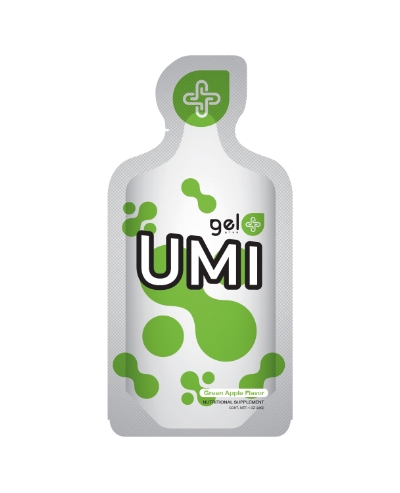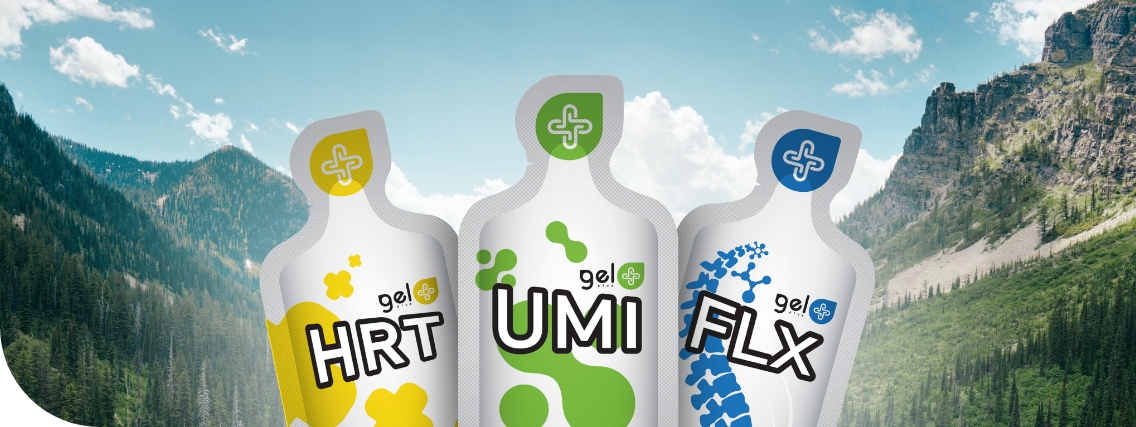GelPlus UMI (Green Apple Flavor)

DESCRIPTION
UMI is rich in Antioxidant from Deep-Sea Brown Seaweed, Kelp aka Fucoidan enrich protein and transform enzyme into immune cells
*These statements have not been evaluated by the Food and Drug Administration. This product is not intended to diagnose, treat, cure or prevent any disease. Products shown may not be available in every location and where available may be for personal use only.
$ 160.00
per one box-
General Details
-
FACTS
-
INGREDIENTS
-
UMI video
-
Bibliography
General Details
FACTS
INGREDIENTS
UMI video
Bibliography
Documents
Fucoidan is one of the most exciting nutritional discoveries of the last decade, so it is important that millions discover it for themselves. UMI is rich in this amazing ingredient derived from brown seaweed, which for centuries has been heralded by cultures with famously long life spans.
Find out what many have known for centuries.In coastal and island cultures around the world, fucoidan-rich brown seaweed has been considered a staple of healthy nutrition for centuries. It looks like they were on to something. Their choice to include seaweed in their diet is now supported by science. There are hundreds of studies already published about the potential health benefits of fucoidan, and many other health experts and scientists are now exploring the possibilities of this incredible nutrient.
Improve your immune system.Fucoidan has been shown to sustain and promote better health. It also helps promote the health of white blood cells, and supports their production in the body. Healthy white blood cells are a critical part of your body is immune-response.
What can UMI do for you?Here are just a few of the many potential benefits:
1. Helps replace dead cells enabling tissue and organ regeneration
2. Supports the immune system by increasing healthy white blood cells
3. Provides assistance to the circulatory and cardiac system in maintaining normal blood flow and cardiac function
4. Assists in inducing apoptosis - the natural means by which organisms eliminate harmful cells
5. Supports proper liver and kidney function
In many parts of the world, seaweed is not a regular part of the daily diet. In fact, there are many people who would not even consider eating seaweed. However, with GelPlus UMI, the exceptional health benefits of this oceanic treasure are now available to the masses. So, what is it about the brown seaweed that is so extraordinary? Through extensive research, scientists have identified a complex sulfated polysaccharide, called fucoidan as the active ingredient. Its primary makeup consists of an essential sugar called fucose along with other elements such as xylose, mannose, and galactose, and glucose. Studies consistently show that fucoidan possesses a wide range of properties beneficial to maintaining optimal health.
One of the primary ways in which Fucoidan provides a vast array of health benefits is its ability to interact with and modulate the immune system. Several studies have identified many of the immune-modulating effects of Fucoidan. The ability of a substance to modulate the immune system is an extremely useful property. Modulation is a term used to describe the process of reducing the extremes of cellular activity & mash; either stimulation or inhibition. Immune-modulating substances have the ability to increase immune function when it is depressed, and also to reduce it when it is over-stimulated..
Most immune-modulating agents work by improving inter-cellular communication. One way cells interact and communicate is by presenting glycoproteins on their surface. Glycoproteins are complex information-rich macromolecules composed of a protein core to which are bound arrays of linked chains of sugars (polysaccharides). The structures of the polysaccharides vary and therefore relay different codes for different messages. For example, one message might tell a cell to secrete a specific cellular product, and another message might tell a cell when to divide. Other cells have corresponding glycoprotein receptor molecules, which can then read these messages and respond accordingly. Thus, our bodies are involved in very sophisticated and harmonious intercellular communication all the time.
The immune system depends heavily on this kind of communication to coordinate cellular defense, apoptosis, cell attack, and repair processes. When any of the range of individual saccharides required to build competent glycoproteins (and thereby convey an accurate message) are missing, the quality of that communication is compromised. It has been shown that the dietary supply of certain saccharides improves the integrity of glycoprotein production. Fucoidans provide an abundant supply of Fucose, one of the necessary saccharides, and smaller amounts of several other required sugars. This is likely to be one mechanism by which the fucoidans exert their immunomodulatory effect.
Now, with this understanding of glycoproteins, and intercellular communication, lets specifically identify the ways in which Fucoidan has been shown to be of significant benefit for health and wellness.
References Kuznetsova TA, Zaporozhets TS, Besednova NN, et al. Antibiot Khimioter. 2003;48(4):11-3.Zapopozhets TS, Besednova NN, Loenko IuN. Antibiot Khimioter. 1995 Feb;40(2):9-13.
Regenerate Cells Much of the research that has been done on fucoidan has been focused on its ability to regenerate cells. Studies have shown that fucoidan helps support the mobilization of stem cells that enable the body to replace dead cells thereby enabling tissue and organ regeneration. In addition, fucoidan helps slow symptoms of the aging process. In study after study, fucoidan has shown itself to be beneficial in the fight for a long, healthy life.
References
Frenette PS, Weiss L. Blood, 2000 Oct 1 96(7):2460-8
Support the Circulatory System & Health Functions
Fucoidan has also been shown to help maintain healthy blood flow and cardiac functions, thereby supporting the circulatory system. Increased blood flow helps all of our organs work more efficiently and helps us to feel better and healthier. Efficient functioning of our vital organs can help us reduce the effects of wear and tear of the normal aging process. Additionally, one study suggested that fucoidan helps to slow the absorption rate of glucose, or sugar, into the bloodstream. A slower absorption rate helps to maintain a more regulated blood sugar level and minimize the damage potentially caused by high blood sugar levels.
References
Colliec S, Fischer AM, Tapon-Bretaudiere J, Boisson C, Durrand P, Jozefonvicz J. Thromb Res. 1991 Oct 15;64(2):143-54.
Dittrich S, Lippek F, Gratopp A, Grosse-Siestrup C, Lange PE, Buhrer C. Clin Exp Pharmacol Physiol. 2002 Oct; 29 (10): 909-14
McCaffrey TA, Falcone DJ, Borth W, Brayton CF, Weksler BB. Biochem Biophys Res Commun. 1992 Apr 30;184(2):773-81.
Ruperez P. Ahrazern O. Leal JA Agrie Food Chem. 2002 Feb 13;50(4):840-5
Soeda S, Sakaguchi S, Shimeno H, Nagamatsu A. Biochem Pharmacol.
1992 Apr 15;43(8):1853-8.
Maintain Existing Normal Cholesterol Levels
The process of cholesterol formation occurs in the liver. Our bodies produce a good cholesterol (HDL) and a bad cholesterol (LDL). Optimum health is achieved when we can maintain LDLs and HDLs already in the normal range. There is some evidence to suggest that fucoidan can help us to maintain existing healthy levels of cholesterol by influencing the metabolic activity in the liver where fatty acids are processed.
References
Murata, M. et al. Journal of Nutrition, 1999 Jan:29(1):146-51.
Help Support Healthy Joint Functions
For many of us in the United States and throughout the world, maintaining healthy joints and cartilage are daily concerns. Among its many properties, fucoidan has been hailed as a natural answer to joint health. Fucoidan supports proper joint functions and cartilage health by modulating some of our body s processes.
References
Bartlett MR, Warren HS, Cowden WB Parish CR Immunol Cell Biol. 1994 Oct; 72(5):367-74
Choi EM, Kim AJ, Kim YO, Hwang JK. J Med Food. 2005 Winter;8(4):446-53.
Senni K, Gueniche F, Foucault-Bertaud A, Igondjo-Tchen S, Fioretti F, Colliec-Jouault S, Durand P, Guezennec J, Godeau G, Letourneur D. Arch Biochem Biophys. 2006 Jan 1;445(1):56-64.
Assist in Inducing the Elimination of Harmful Cells
Fucoidan may also prove helpful in eliminating harmful cells. This is accomplished through a process called apoptosis. Apoptosis is the technical term for the programmed process of a cell bursting and therefore dying. Sulphated polysaccharides like fucoidan have been shown to assist in inducing appropriate programmed apoptosis, which is a natural process where living organisms eliminate harmful cells and render the genetic blueprint (DNA) of harmful cells useless.
References
Haneji K, Matsuda T, Tomita M, Kawakami H, Ohshiro K, Uchihara JN, Masuda M, Takasu N, Tanaka Y, Ohta T, Mori N. Nutr Cancer. 2005;52(2):189-201.
Itoh H. Noda H, Amano H, Zhuang C, MizunoT, Ito H Res. 1993 Nov-Dec;13(6A):2045-52
Maruvama H, Tamauchi H, Hashimoto M, Nakano T. In Vivo. 2003 May-Jun;17(3):245-9
Riou D, Colliec-Jouault S, Pnczon du Sel D, Bosch S, Siavoshian S, Le Bert V, Tomasoni C, Sinquin C, Durand P, Roussakis C. Anticancer Res. 1996 May-Jun;16(3A):1213-8.
Help Maintain a Strong Immune System
Fucoidan supports the immune system in a number of different ways. Some research suggests that it may cause an increase in the number of circulating mature white blood cells in the body, which are an integral part of the body s natural immune system.17 The findings from other studies suggest that fucoidan supports the immune system by improving phagocytosis and activating other important immune responses.
References
Baba M, Nakajima M, Schols D, Pauwels R, Balzarini J, De Clercq E. Antiviral Res. 1988 Sep;9(6):335-43.
Feldman SC, Reynaldi S, Stortz CA, Cerezo AS, Damont EB. Phytomedicine. 1999 Nov;6(5):335-40.
Itoh H. Noda H, Amano H, Zhuang C, MizunoT, Ito H Anticancer Res. 1993 Nov-Dec;13(6A):2045-52
Zapopozhets TS, Besednova NN, Loenko IuN. Anitbiot Khimoioter. 1995 Feb;40(2):9-13.
Zhuang C. et al. Biosci Biotechnol Biochem, 1995 Apr:59(4):563-7.
Promotes Optimal Gastrointestinal Health
The number of people concerned with maintaining gastrointestinal health is rapidly increasing around the world as more and more people are consuming foods with more fat content and less dietary fiber. Once in the gastrointestinal tract, fucoidan attaches to the lining where it has a protective effect. In addition, it stimulates the gut lining to self-repair tissue. Fucoidan, because of its immune promoting activity, is a tremendous aid in maintaining proper gastrointestinal function and health.
References
Matsumoto S.,Nagaoka M, Hara T. Kimura-Takagi I, Mistsuvama K. Clinical and Experimental Immunology. June 2004, vol. 136, no.3 pp. 432-439(8)
Increase Energy & Support Respiratory Functions
Fucoidan supports immunological abilities by assisting the body in the production of interferon-Y and interleukin-12, two important immune system components, while supporting normal respiratory functions.
References
Granert C. Raud J, Lindquist L, Clinical and Diagnostic Laboratory Immunology, May 1998, 5(3): 322-4
Detoxify the Body and Help Rid The Body of Free Radicals
The deleterious effect of free radicals on our bodies is well documented. The beneficial effect of antioxidants in helping to neutralize the oxidative stresses placed upon our organs and metabolic processes is also very clear. Fucoidan has a long list of health and wellness properties, not the least of which is that it is also a potent antioxidant.
References
Ruperez P, Ahrazem O, Leal JA. Agric Food Chem. 2002 Feb 13; 50(4):840-5
Promotes Kidney Health
The kidneys serve as the waste disposal system for our bodies. Therefore, the proper function of our kidneys is vital to our overall health and wellbeing. There are numerous studies in the literature to suggest that fucoidan may play a significant role in maintaining optimal kidney function.
References
Dittrich S, Lippek F, Gratopp A. Grosse-Siestrup C, Lange PE. Buhrer C, Clin Exp Pharmacol Physiol. 2002 Oct 29(10):909-14
Ruehl ML, Orozco JA, Stoker MB, McDonagh PF, Coull BM, Ritter LS. Neurol Res. 2002 Apr;24(3):226-32.
Zhang Q, Li Z, Xu Z, Niu X, Zhang H. Planta Med. 2003 Jun;69(6):537-41.
Zhang Q, Li N, Zhao T, Qi H, Xu Z, Li Z. Phytother Res. 2005 Jan;19(1):50-3
Supports Vibrant Health & Vitality
The literature is plentiful supporting the fact that fucoidan is a valuable resource for maintaining optimal health. The brown algae harvested from the earths ocean are truly one of the most valuable gifts of the great deep. And GelPlus has harnessed this power into a single gelceutical&mash;UMI.
References
Klegeris A. Singh EA. McGerr PL Immunology 2002 Jul;106(3):381-8
* These statements have not been evaluated by the Food and Drug Administration. This product is not intended to diagnose, treat, cure or prevent any disease. Products shown may not be available in every location and where available may be for personal use only.
GelPlus UMI is a powerful punch of fucoidan. Found within brown seaweed, fucoidan has a wealth of benefits that are continuously being identified. UMI means sea and if there is such a thing as a sunken treasure- fucoidan is it. Forget fucoidan pills, gel suspension is here. Seaweed never tasted so good.
Other Ingredients: Water, Fructose, Malic Acid, Citric Acid, Xanthan Gum, Guar Gum, Natural Flavors, Green Coloring (Copper Chlorophylin), Sodium Benzoate
Fucoidan References
Baba M, Nakajima M, Schols D, Pauwels R, Balzarini J, De Clercq E. Antiviral Res. 1988 Sep;9(6):335-43.
Bartlett MR, Warren HS, Cowden WB Parish CR Immunol Cell Biol. 1994 Oct; 72(5):367-74
Choi EM, Kim AJ, Kim YO, Hwang JK. J Med Food. 2005 Winter;8(4):446-53.
Colliec S, Fischer AM, Tapon-Bretaudiere J, Boisson C, Durrand P, Jozefonvicz J. Thromb Res. 1991 Oct 15;64(2):143-54.
Dittrich S, Lippek F, Gratopp A, Grosse-Siestrup C, Lange PE, Buhrer C. Clin Exp Pharmacol Physiol. 2002 Oct; 29 (10): 909-14
Dittrich S, Lippek F, Gratopp A. Grosse-Siestrup C, Lange PE. Buhrer C, Clin Exp Pharmacol Physiol. 2002 Oct 29(10):909-14
Feldman SC, Reynaldi S, Stortz CA, Cerezo AS, Damont EB. Phytomedicine. 1999 Nov;6(5):335-40.
Frenette PS, Weiss L. Blood, 2000 Oct 1 96(7):2460-8
Granert C. Raud J, Lindquist L, Clinical and Diagnostic Laboratory Immunology, May 1998, 5(3): 322-4
Haneji K, Matsuda T, Tomita M, Kawakami H, Ohshiro K, Uchihara JN, Masuda M, Takasu N, Tanaka Y, Ohta T, Mori N. Nutr Cancer. 2005;52(2):189-201.
Itoh H. Noda H, Amano H, Zhuang C, MizunoT, Ito H Anticancer Res. 1993 Nov-Dec;13(6A):2045-52
Itoh H. Noda H, Amano H, Zhuang C, MizunoT, Ito H Anticancer Res. 1993 Nov-Dec;13(6A):2045-52
Klegeris A. Singh EA. McGerr PL Immunology 2002 Jul;106(3):381-8
Kuznetsova TA, Zaporozhets TS, Besednova NN, et al. Antibiot Khimioter. 2003;48(4):11-3.
Maruvama H, Tamauchi H, Hashimoto M, Nakano T. In Vivo. 2003 May-Jun;17(3):245-9
Matsumoto S.,Nagaoka M, Hara T. Kimura-Takagi I, Mistsuvama K. Clinical and Experimental Immunology. June 2004, vol. 136, no.3 pp. 432-439(8)
McCaffrey TA, Falcone DJ, Borth W, Brayton CF, Weksler BB. Biochem Biophys Res Commun. 1992 Apr 30;184(2):773-81.
Murata, M. et al. Journal of Nutrition, 1999 Jan:29(1):146-51.
Riou D, Colliec-Jouault S, Pnczon du Sel D, Bosch S, Siavoshian S, Le Bert V, Tomasoni C, Sinquin C, Durand P, Roussakis C. Anticancer Res. 1996 May-Jun;16(3A):1213-8.
Ruehl ML, Orozco JA, Stoker MB, McDonagh PF, Coull BM, Ritter LS. Neurol Res. 2002 Apr;24(3):226-32.
Ruperez P, Ahrazem O, Leal JA. Agric Food Chem. 2002 Feb 13; 50(4):840-5
Ruperez P. Ahrazern O. Leal JA Agrie Food Chem. 2002 Feb 13;50(4):840-5
Senni K, Gueniche F, Foucault-Bertaud A, Igondjo-Tchen S, Fioretti F, Colliec-Jouault S, Durand P, Guezennec J, Godeau G, Letourneur D. Arch Biochem Biophys. 2006 Jan 1;445(1):56-64.
Soeda S, Sakaguchi S, Shimeno H, Nagamatsu A. Biochem Pharmacol. 1992 Apr 15;43(8):1853-8.
Zapopozhets TS, Besednova NN, Loenko IuN. Anitbiot Khimoioter. 1995 Feb;40(2):9-13.
Zapopozhets TS, Besednova NN, Loenko IuN. Antibiot Khimioter. 1995 Feb;40(2):9-13.
Zhang Q, Li N, Zhao T, Qi H, Xu Z, Li Z. Phytother Res. 2005 Jan;19(1):50-3
Zhang Q, Li Z, Xu Z, Niu X, Zhang H. Planta Med. 2003 Jun;69(6):537-41.
Zhuang C. et al. Biosci Biotechnol Biochem, 1995 Apr:59(4):563-7.
If you would like to review associated publications in more detail we suggest you use PubMed, the information portal provided by the US National Library of Medicine and the National Institutes of Health. PubMed is a service of the U.S. National Library of Medicine that includes over 17 million citations from MEDLINE and other life science journals for biomedical articles back to the 1950s.
To find a reference on PubMed, copy the reference for the article you want to read from the Agel Bibliography page and paste it in the Search PubMed for entry box on the following web page: http://www.ncbi.nlm.nih.gov/sites/entrez?db=pubmed
Related Products

UMI 28g. (Gel Plus Brand)
Gelplus UMI Rich in Antioxidant from Deep-Sea Brown Seaweed, “Kelp” aka “Fucoidan” enrich protein and transform enzyme into immune cells
VIEW PRODUCT
UMI 28g. (Gel Plus Brand)
Gelplus UMI Rich in Antioxidant from Deep-Sea Brown Seaweed, “Kelp” aka “Fucoidan” enrich protein and transform enzyme into immune cells
VIEW PRODUCT
UMI 28g. (Gel Plus Brand)
Gelplus UMI Rich in Antioxidant from Deep-Sea Brown Seaweed, “Kelp” aka “Fucoidan” enrich protein and transform enzyme into immune cells
VIEW PRODUCT
UMI 28g. (Gel Plus Brand)
Gelplus UMI Rich in Antioxidant from Deep-Sea Brown Seaweed, “Kelp” aka “Fucoidan” enrich protein and transform enzyme into immune cells
VIEW PRODUCT
UMI 28g. (Gel Plus Brand)
Gelplus UMI Rich in Antioxidant from Deep-Sea Brown Seaweed, “Kelp” aka “Fucoidan” enrich protein and transform enzyme into immune cells
VIEW PRODUCT
UMI 28g. (Gel Plus Brand)
Gelplus UMI Rich in Antioxidant from Deep-Sea Brown Seaweed, “Kelp” aka “Fucoidan” enrich protein and transform enzyme into immune cells
VIEW PRODUCT
UMI 28g. (Gel Plus Brand)
Gelplus UMI Rich in Antioxidant from Deep-Sea Brown Seaweed, “Kelp” aka “Fucoidan” enrich protein and transform enzyme into immune cells
VIEW PRODUCT
UMI 28g. (Gel Plus Brand)
Gelplus UMI Rich in Antioxidant from Deep-Sea Brown Seaweed, “Kelp” aka “Fucoidan” enrich protein and transform enzyme into immune cells
VIEW PRODUCT

